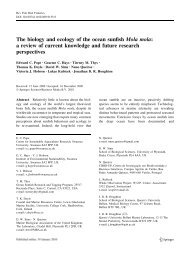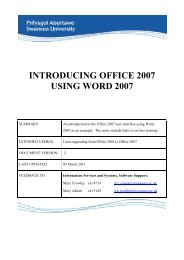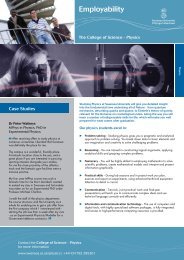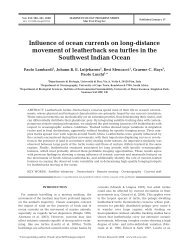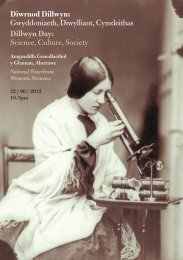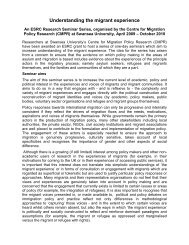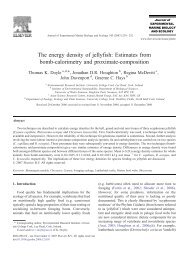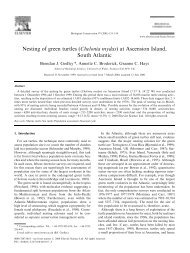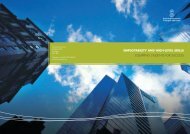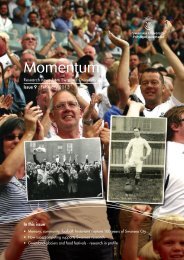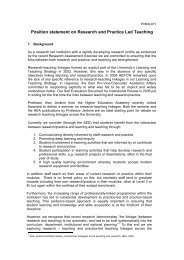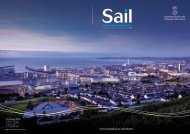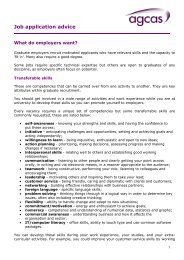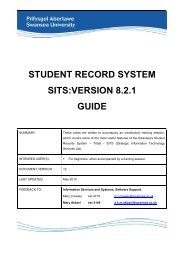ESRC Seminar Series - Briefing Paper 5 - Swansea University
ESRC Seminar Series - Briefing Paper 5 - Swansea University
ESRC Seminar Series - Briefing Paper 5 - Swansea University
Create successful ePaper yourself
Turn your PDF publications into a flip-book with our unique Google optimized e-Paper software.
• Amplify migrant voices and perspectives and to reach and engage a diversity of<br />
audiences;<br />
• Facilitate workshops, events and mentoring activities and then to transfer skills, into<br />
the NGO sector; and<br />
• Research migration and produce media in the service of social justice<br />
A critical point for FOMACS is the politics of story telling - the politics of the voice in terms<br />
of migrant experiences. As Áine highlighted “…everybody has voices, everybody has<br />
agencies, however, the problem is not just about giving voice it is about having those voices<br />
heard meaningfully.” Áine identified the politics of listening as a major factor in the<br />
intersection between story and strategy, particularly in relation to the impact of social media<br />
campaigns and their ability to effect change. Drawing on Romand Coles’ work on the power<br />
of listening, Áine left us with the following quote:<br />
“A big part of the problem too, is likely to be that most of us do not listen to one<br />
another well if and when we listen at all. We have not only marginalized the arts of<br />
voice, we have, relatedly, and perhaps even more so, marginalized the arts of<br />
listening. Certainly the democratic arts of voice and listening are deeply related, but<br />
all too often we interpret and seek to nurture democracy through a lens that greatly<br />
accents the former and adds the latter almost as an afterthought. The alternative<br />
idea here is that if democratic voices are weak in a community, it is probably<br />
significantly because efforts to develop political voice have not dwelled in nor<br />
sufficiently passed through the arts of listening” (Coles, 2004, p.687)<br />
The presentation was concluded with the showing of a variety of examples of FOMACS<br />
work, each of which represented very different types of story telling. These included a<br />
documentary film, an excerpt from a feature length film, a three minute animation and a<br />
digital story.<br />
‘Stories that matter: refugee women and the representation of political claims’ -<br />
Dr Leah Bassel, City <strong>University</strong><br />
Dr Leah Bassel’s presentation explored the ways in which migrant voices are, or are not,<br />
taken up in broader social and political narrative and how this particularly impacts upon the<br />
voices of migrant women and their ability to be heard.<br />
Leah firstly outlined the theoretical elements of her argument, drawn from democratic<br />
theory and the approach known as intersectionality. She then discussed practice on the<br />
ground in terms of the existing power relations and limits to articulating an alternative<br />
perspective, and how these become visible at the intersection between asylum and<br />
integration and immigration. Situating this in the broader social context of a “gendered<br />
politics of integration, the gendered politics of the way people make the transition from<br />
outsider to citizen”, Leah postulated that some women’s voices may be subject to<br />
misinterpretation and instrumetalisation whilst others may be denied or silenced. Leah<br />
related this to current debates around multiculturalism articulated through the veil, the<br />
burka, or full face covering, and issues around female genital mutilation and forced marriage,<br />
in this context she argued, the politics of integration can increasingly be viewed as a<br />
gendered politics of the body. However for Leah the issue is less about the politics of<br />
multiculturalism and more about the voice, agency and possibilities of participation for the<br />
women who are at the centre of these debates but who are also situated at the interception<br />
of multiple social justice agendas.<br />
Leah argued that “…it is not enough for the women who are seen to be at the centre of<br />
these debates to just be able to participate within them…meaningful participation …has to<br />
mean something more. It has to mean being able also to challenge the terms of the debate<br />
itself, to challenge the way that democratic context is even constructed.” Furthermore, Leah<br />
perceives the exclusion of voices that do not conform to the victim versus agent narrative<br />
as a democratic failure, a failure of politics. She concluded her presentation with an appeal



